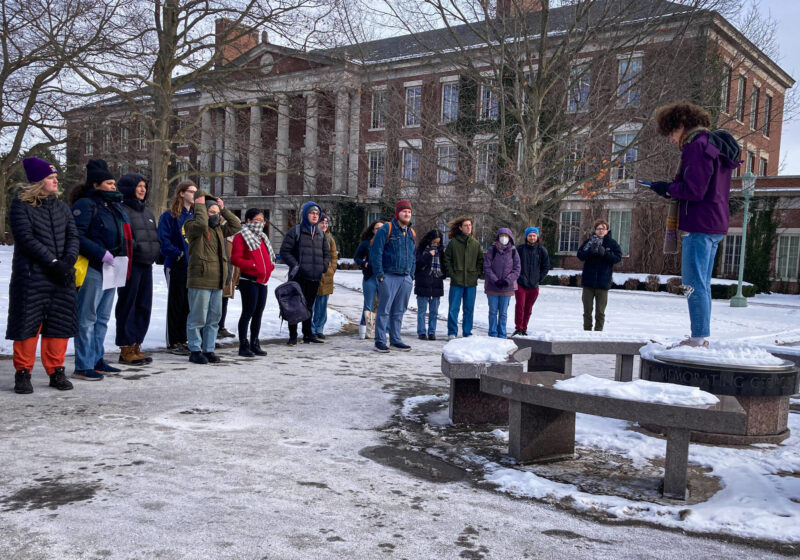A UR student was diagnosed with measles on Friday, Feb. 7. He has since recovered and is no longer contagious, according to Vice Provost and Director for University Health Service (UHS) Dr. Ralph Manchester.
According to an advisory from the New York State Department of Health Bureau of Immunization (NYSDOH), “Monroe County was notified of a case of measles in a college student who recently returned from the Republic of Georgia,” and “reported receiving two measles-containing vaccines in his home country.”
Manchester confirmed this.
“We’re not sure how the student became infected, but the timing suggests it happened during the winter break when he was out of the country,” he said.
Manchester sent an email out through the Weekly Buzz on Feb. 10 containing an announcement of the diagnosis.
Manchester said that he worked with the Monroe County Health Department, Provost Peter Lennie, Dean of the College Richard Feldman, Dean of Students Matthew Burns, members of the President’s staff, and Medical Center experts “to develop a communications plan.”
Manchester sent a separate email to UR faculty and staff requesting that they record their immunization history on the Human Resources Management System (HRMS) Website. The deadline for faculty and staff to do so was originally Tuesday, Feb. 11 but has since been extended to Friday, Feb. 14. UHS has records of student immunization but not that of faculty and staff.
“We know the measles immunity of full-time and most part-time students,” Manchester said. “We are gathering measles vaccine information on River Campus faculty and staff so that we can determine how many of them might be susceptible to measles.”
As of Feb. 10, Manchester said that about 1% of faculty and staff reported that they were “quite sure” they had never received a measles vaccine.
New York State law requires that college students must provide proof of immunity to measles within 30 days of starting classes, but 13 UR undergraduates and graduates were exempt for medical or religious reasons.
The Institute for Vaccine safety states that some religions are opposed to the “porcine origins” of certain vaccinations.
The 13 students were contacted by Manchester and told to take a blood test to determine their immunity to measles. Manchester reported that some tests revealed immunity in students, but students who did not test immune were quarantined off campus.
Manchester also verified the immunity of the students who were in classes with the student diagnosed with measles within 48 hours of the diagnosis.
“The period of time during which a susceptible person is at risk for developing measles will last until Feb. 20,” Manchester said.
First-year masters degree student David Heid received the email from Manchester the day after the student was diagnosed, along with the other susceptible students. Heid was exempt from the vaccination on religious grounds.
“A large part of why I am not vaccinated is because my grandfather got shingles when he was vaccinated,” Heid added. “He later developed MS and died shortly after I was born as a result.”
Heid has been “officially” quarantined since Tuesday, Feb. 11 when his blood test showed he was not immune.
Heid expressed his feelings regarding UHS’s role in providing resources such as food, religious services, and academic participation.
“I was told I can’t go to church, I can’t go to the gym, I can’t go into the community, and I can’t go home unless I avoid using public transportation,” Heid said. “I understand the need for precautions, but I’m frustrated UHS has offered no assistance whatsoever regarding religious practices and other basic needs. I can’t go grocery shopping for myself, and must rely on the kindness and availability of my housemates.”
Heid mentioned that someone from UHS recommended he go to church “by phone.” He also organized with his professors to listen to lectures via Skype, and he said he cannot fulfill his responsibilities as a TA.
“I do understand the need to follow NY State policy, but UR should be helping its students take appropriate action instead of neglecting our basic needs,” Heid said.
Heid also said that he is frustrated that some quarantined students who have meal plans are being provided meals by UR while he is not allowed to leave even to buy groceries.
“I understand the need to keep everyone safe, and I agree an individual’s religious beliefs should not hurt others,” Heid said. “However, I also believe that public health shouldn’t be detrimental to my own health and well-being.”
Manchester commented on UHS’s role in providing for the quarantined students as well.
“Quarantine is not easy,” Manchester said. “We had a plan in place to help any undergrads who were placed in quarantine, and we will be able to help any student who is unable to make arrangements for basic necessities such as food and medicine.”
Heid also said that he believes UHS’s handling of the situation is inconsistent. He was told that he is not allowed out in public, “but they aren’t actually checking up on [him] in any way, and that students would be allowed back on campus immediately if they agreed to the vaccination, even though the vaccination would not take effect immediately.”
“Quarantine is mandated by the New York State Department of Health through the Monroe County Health Department as its local representative,” said Manchester. This signifies that, by law, the health department can enforce quarantine if any individuals try to violate “quarantine requirements.”
“I do feel that the precautions in place are overkill given the amount of ‘exposure’ that could still take place given their policies,” Heid said.
Manchester said that only “a couple of graduate students who live off campus are in quarantine,” and that no undergraduates had to be taken off campus for quarantine.
According to the advisory from the NYSDOH, four counties of New York, have reported a case of measles, one of which was already vaccinated, in people who have recently been abroad in places like the Philippines and the Republic of Georgia, which are both experiencing large outbreaks of measles.
The advisory also reported that “in 2013, a total of 189 cases of measles were reported in the U.S. of which 98% resulted from international travel and 92% of these cases were unvaccinated or had unknown vaccination history.”
Centers for Disease Control and Prevention (CDC) said that about 37-220 cases of measles are reported in the U.S. each year, with a median of 62 cases.
UHS will be giving measles vaccinations from 4:00 to 5:30pm on Thursday, Feb. 13 for those who are still susceptible to infection.
McAdams is a member of the class of 2017.





